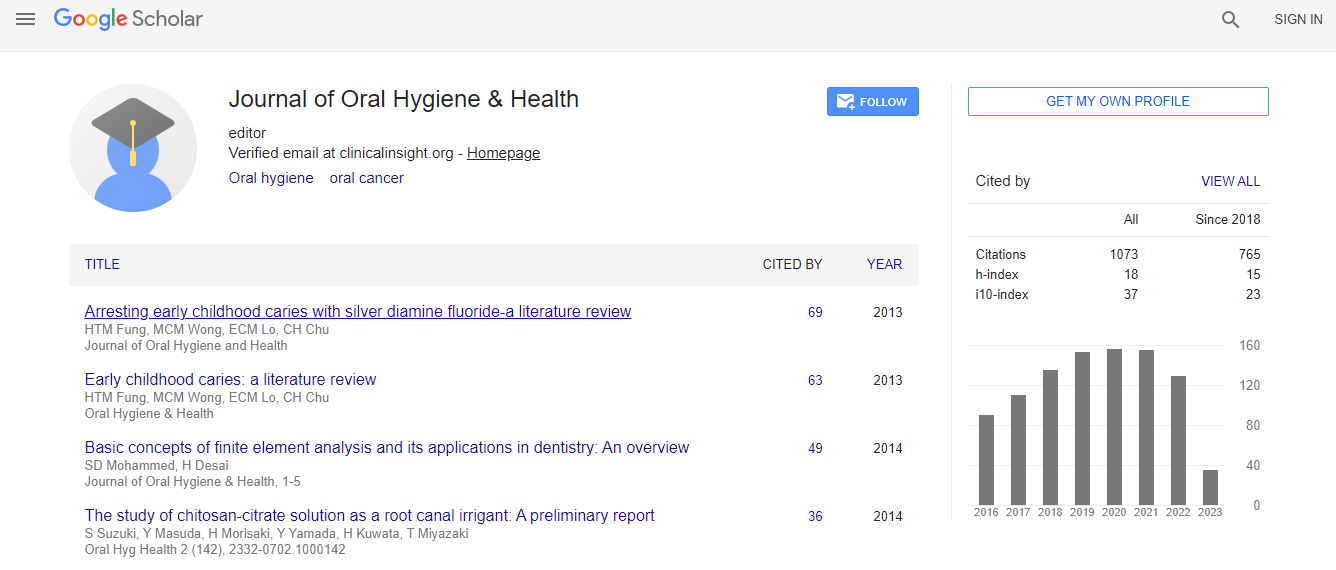Our Group organises 3000+ Global Conferenceseries Events every year across USA, Europe & Asia with support from 1000 more scientific Societies and Publishes 700+ Open Access Journals which contains over 50000 eminent personalities, reputed scientists as editorial board members.
Open Access Journals gaining more Readers and Citations
700 Journals and 15,000,000 Readers Each Journal is getting 25,000+ Readers
Google Scholar citation report
Citations : 1073
Journal of Oral Hygiene & Health received 1073 citations as per Google Scholar report
Journal of Oral Hygiene & Health peer review process verified at publons
Indexed In
- Index Copernicus
- Google Scholar
- Open J Gate
- JournalTOCs
- RefSeek
- Hamdard University
- EBSCO A-Z
- OCLC- WorldCat
- Publons
- Geneva Foundation for Medical Education and Research
- Euro Pub
- ICMJE
Useful Links
Recommended Journals
Related Subjects
Share This Page
Surg and rescue: Saving the natural implant through modern minimally-invasive, laser-assisted apical microsurgery
Annual Congress on Endodontics, Orthodontics, Prosthodontics and Dental Implants
Tuong Nguyen Nguyen
Case Western Reserve University, USA
Keynote: J Oral Hyg Health
Abstract
As dentists, our goal should always be to save the natural tooth or “natural implant.” Extraction should only be the last resort. Adequate training, experience through continual practice, and specialized equipment provide the adequate context to address cases that represent an unusual challenge. In the case of complex anatomy where the root apex cannot be properly cleaned and periapical healing cannot be obtained, the dentist or endodontist is faced with the challenges of diagnosing properly, planning adequately and executing effectively without causing unnecessary harm to the patient. In such cases, apical microsurgery is recommended to complement the orthograde endodontic treatment, with the ultimate goal of saving the natural tooth. It is unfortunately not uncommon to find general dentists and endodontists recommend against apical surgery due to lack of training or practice and therefore fear of performing apical surgery. This fear factor is enhanced even further with the concern of causing further harm to structures such as the sinus or mental foramen. In addition, apical surgery is often underestimated as to its ability to induce periradicular healing. Such concerns could be much alleviated if accuracy and effectiveness is warranted when performing such procedure. Even though CBCT is highly accurate in all 3 dimensions, its high cost deters many clinicians from owning such technology and using it in their day-to-day practice. CBCT scans improve accuracy in visualization of apical pathosis, critical anatomical structures (mental foramen, sinus) and root anatomy. Additional benefits include effectiveness in locating all main root canals, analysis of resorptive lesions and pre-surgical assessment prior to apical surgery. Effectiveness is enabled through the use of the Er,Cr:YSGG iPlus laser. Laser irradiation provides an extremely precise cut through the interaction of laser energy with the tooth surface. Its optimal zone of ablation lies within 2 to 3mm from the laser tip. Therefore, when the iPlus laser is coupled with enhanced magnification, the clinician is capable of delivering an unrivaled level of precision. In addition to precision, the iPlus is also known to be superior to mechanical methods in eradicating bacteria from dentinal tubules at a depth of 1000μm; when applied to the removal of the root apex, accelerated post-surgical healing can be attributed to the laser’s ability to remove the smear layer and its excellent bactericidal potential. Fianlly, the minimally-invasive effect of the Er,Cr:YSGG iPlus laser is undeniable. The level of cell necrosis is 30:1 ratio when comparing the scalpel to the Er,Cr:YSGG laser. Diode lasers on the other hand are well known for their ability to induce biostimulation, also known as LLLT or Low Level Laser Therapy. In such process, low levels of laser energy enhance healing while decreasing the deleterious effects of inflammation and therefore unnecessarily prolonged periods of pain. In sum, the Er,Cr:YSGG iPlus and diode EpicX lasers paired with CBCT technology and the Dental Operating Microscope, should be more widely taught and used in endodontics. Unfortunately, poor training and misuse of these devices have led to misunderstanding and suspicion of their true capabilities. A combination of open-mindedness and concerted educational effort is needed from educators, researchers, clinicians and vendors to provide our patients with the modern technology that they deserve at the dawn of the 21st century. In this lecture, Dr. Nguyen will demonstrate the scientific evidence, indications, clinical step-by-step and tremendous patients benefits of laser-assisted apical microsurgery. Clinical cases and videos will be used to illustrate the principles Upon completion of the session, attendees shall be able to 1. Adequately treatment plan for orthograde retreatment versus apical surgery 2. Understand the basic foundation of conventional apical surgery 3. Understand the benefits and clinical steps of laser-assisted apical surgery 4. Integrate the the Dental Operating Microscope and CBCT as part of the endodontic surgical armamentarium 5. Understand Return On Investment for the Dental Operating Microscope, CBCT and laser technologyBiography
Tuong Nguyen Nguyen has earned his Bachelor’s degree in Dental Sciences in 1997 from the Catholic University of Louvain in Brussels, Belgium. He subsequently earned his Certificate in Clinical Endodontics and Master of Science in Dentistry degree in 2001 from Case Western Reserve University in Cleveland, OH. He was a full-time Assistant Professor in the Department of Endodontics at the University of Maryland from 2001 to 2004 and at the Oregon Health and Science University from 2004 to 2008. He is the Founder of Polaris Dental Specialists and the Love All Foundation. He currently practices at Polaris Dental Specialists, a multi-specialty practice in Beaverton and Salem, OR, USA. He is a Master at the World Clinical Laser Institute and Adjunct Professor of Endodontics at Case Western Reserve University.
E-mail: drnguyen@polarisdentalspecialists.com

 Spanish
Spanish  Chinese
Chinese  Russian
Russian  German
German  French
French  Japanese
Japanese  Portuguese
Portuguese  Hindi
Hindi 
